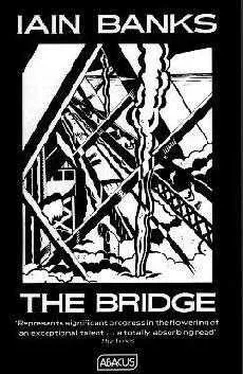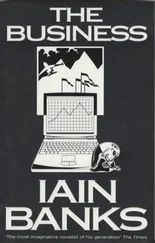I ask him what they are going to do with me. He tells me instead about the combined prison and police headquarters I am now in. It is mostly underground, as I had guessed. He explains, with genuine enthusiasm, the principles upon which it has been designed and built, warming to his subject as he goes on. The prison/HQ is in the form of several tall, buried cylinders; inverted circular skyscrapers interred together beneath the surface of the city. He is deliberately vague about the exact number, but I form the impression there are between three and six of these close-packed cylinders. Each of these huge sunken drums contains many hundreds of rooms: cells, offices, toilets, canteens, dormitories, and so on, and each cylinder can be individually rotated, like some immense battleship magazine, so that the orientation of the corridors and doors leading into and out of each drum can be changed almost continually. A door which one day leads to a lift or an underground car park or a railway station or a certain place in one of the other cylinders might on the following day lead to a completely different cylinder, or to solid rock. From day to day, even - in conditions of high security alert - from hour to hour, this massive gearbox of revolving drums can be moved either at random or according to a complex, coded pattern, thus totally confounding the planning and execution of any attempted escape. The information necessary to decode these erratic transformations is distributed to the police and staff strictly on a need-to-know basis, so that nobody ever knows in exactly what new configuration the composite subterranean complex has been arranged; only the very highest and most trusted officials have access to the machines which set up and oversee these rotations, and the machinery and electronics which are its muscles and nerves are so designed that no engineer or electrician working on any conceivable fault or failure could possibly gain a working overview of the whole system.
The fellow's eyes are bright and wide as he describes all this to me. My head hurts, my vision is blurred and I need to relieve myself, but I agree, quite honestly, that it is a considerable work of engineering. But don't you see? he says, don't you see what it is, what it is an image of? No, I don't, I confess, ears ringing.
A lock! he says triumphantly, eyes flashing. It is a poem; a song in metal and rock. A perfect, real image of its purpose; a lock, a safe, a set of tumblers; a safe place to store evil.
I see what the man means. My head throbs and I black out.
When I wake up it is on another train and I've peed my pants.
'Versions of the truth disseminated, To the flock like plastic shrapnel, Getting under the skin of most, And on the nerves of some. - Another chip off the old blastema, Another symptom of the system; The bloom and sump of your diabetical materialism.
'Come give us your excuses, Explain why you did what you had to do; Tell us of your hurting to be kind. You talk of: Bloody Sundays. Black Septembers, And all the time you're wasting.
'We'll smile, dissemble, Case the joint for barricades, Count the weapons, Cost the operation, And mutter back meantime "I believe that's just the way it happened. I'm sure it's exactly as you say."'
'... Oh well, very radical. Lot of street cred there.' Stewart nodded. 'I've always said a good poem's worth a dozen Kalash-nikovs.' He nodded again and drank from his glass.
'Look, asshole, just tell me if you mind the bit about "Diabetical Materialism".'
Stewart shrugged, reached for another bottle of Pils. 'Doesnae bother me, pal. You just go ahead. That a new poem?'
'No, ancient. But I'm thinking I might try to get some printed. Just thought you might be offended.'
Stewart laughed. 'God, you're a daft bugger sometimes, you know that?'
'I know that.'
They were in Stewart and Shona's house in Dunfermline. Shona had taken the kids to Inverness for the weekend; he'd come over to leave their Christmas presents and talk to Stewart. He needed somebody to talk to. He opened another can of export and added the ring-pull to the growing pile in the ashtray.
Stewart poured the Pils into his glass and took the drink over to the hi-fi. The last record had ended a few minutes earlier. 'How about a blast from the past?'
'Yeah, let's wallow in nostalgia. Why not.' He settled back in the seat, watching Stewart thumb through the collection of records and wishing he'd been able to think of something more imaginative than record tokens to give the kids. Well, it was what they'd both asked for. Ten and twelve; he remembered he'd bought his first single on his sixteenth birthday. These youngsters already had their own album collections. Oh well.
'Good heavens,' Stewart said, taking out a blue and grey cover and looking slightly shocked. 'Did I really buy Deep Purple In Rock ?'
'You must have been stoned,' he told him. Stewart turned round and winked at him as he took the record out. 'Oh, eh? Was that a little flash of wit there?'
'Merely a scintilla; put the goddamn record on.'
'Well it hasn't been played for a while, just let me clean it here ...' Stewart cleaned the record, put it on: Can't Stand The Rezillos . My God, he thought, that was from 1978; a blast from the past already, indeed. Stewart nodded in time to the music, then sat down in his armchair. 'I like these gentle melodic songs,' he shouted. The track he'd put the stylus down on was Somebody's Gonna Get Their Head Kicked In Tonight .
He raised his can to Stewart. 'God almighty, seven years!' Stewart leaned forward, a hand cupped at one ear. He pointed at the turntable, shouted, 'I said seven years ...' He nodded towards the hi-fi. 'That: seventy-eight.' Stewart sat back, shaking his head emphatically.
'Aw naw; thirty-three and a third,' he shouted.
I am reduced to telling stories for my living. I raid my dreams for tasty morsels to feed my jealous Field Marshal and his motley band of vapidly murderous ancillaries. We hunker down round a fire of fallen flags and precious books, flames glinting on their bandoliers and bayonets; we eat long pig and drink rough whisky; the Field Marshal boasts of famous battles he has won, all the women he has fucked, and then, when he can think of no more lies, he demands a story from me. I tell him the one about the small boy whose dad had a pigeon loft and who later as a man never felt happier than when his proposal of marriage was turned down, at the top of a pigeon-loft folly of monumental proportions.
The Field Marshal looks unimpressed, so I go back to the beginning.
By the time I recovered from my melodramatic swoon in the office of the grey-haired man with the tapping key and the grey desk, the train I'd been put on had crossed the rest of the Republic, steamed across the causeway to the far shore of the nearly circular sea, and travelled some way across a cold waste of tundra.
I had another new set of clothes; a uniform for the train. I was in a small bunk and I'd wet my pants. I felt terrible; my head was pounding, I ached in various places, and the old circular pain in my chest had returned. The train rattled around me.
I was to be a waiter; one who waited. The train contained various elderly officials from the Republic who were on a peace mission - I never did discover exactly who they were or what sort of peace they envisaged - and I, along with an experienced chief steward, was supposed to wait on them in the dining-car, serving them drinks, taking their orders, bringing their food. Luckily they were drunk for most of the time, these ageing bureaucrats, and my initial gaffes went mostly unnoticed as the steward trained me. Sometimes I had to make beds too, or sweep and dust and polish in the sleeping compartments and public carriages.
Читать дальше












